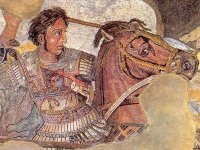
Worksheets and No Prep Teaching Resources
Reading Comprehension Worksheets
Ancient Greece

Ancient Greece
 Worksheets and No Prep Teaching Resources Reading Comprehension Worksheets Ancient Greece |
 Ancient Greece |
| edHelper's suggested reading level: | grades 8 to 10 | |
| Flesch-Kincaid grade level: | 9.22 |
|
Alexander the Great
By Vickie Chao |

|
 1 Since the beginning of time, ambitious military commanders have never been in short supply. Some of them focused on gaining control inside their own kingdoms. Others set their goals higher. Alexander the Great -- or Alexander III -- belonged to the second group. During his short reign of thirteen years, he defeated several regional powerhouses. By the time he died in 323 B.C., he had done the unthinkable and built a kingdom with lands stretching across three continents -- Europe, Asia, and Africa. After him, only a handful of generals could duplicate or even surpass his success. For more than 2,000 years, Alexander the Great has been recognized universally as the world's first great military commander. Here is an account of his life.
1 Since the beginning of time, ambitious military commanders have never been in short supply. Some of them focused on gaining control inside their own kingdoms. Others set their goals higher. Alexander the Great -- or Alexander III -- belonged to the second group. During his short reign of thirteen years, he defeated several regional powerhouses. By the time he died in 323 B.C., he had done the unthinkable and built a kingdom with lands stretching across three continents -- Europe, Asia, and Africa. After him, only a handful of generals could duplicate or even surpass his success. For more than 2,000 years, Alexander the Great has been recognized universally as the world's first great military commander. Here is an account of his life. |
Create Weekly Reading Books
Prepare for an entire week at once! |
| Leave your feedback on Alexander the Great (use this link if you found an error in the story) |
 |
Ancient Greece
|
 |
High School Reading Comprehensions and High School Reading Lessons
|
 |
Social Studies
|